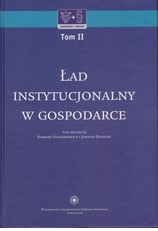KORUPCJA A INSTYTUCJE W GOSPODARCE
CORRUPTION AND INSTITUTIONS IN THE ECONOMY
Author(s): Krzysztof NowakowskiSubject(s): National Economy, Economic development, Corruption - Transparency - Anti-Corruption
Published by: Wydawnictwo Naukowe Uniwersytetu Mikołaja Kopernika
Keywords: Corruption; Institutions; systemic and structural causes of corruption; Polish economy;
Summary/Abstract: Socio-economic transformation as a profound and thorough reform of the system and institutions promotes corruption practices and can be the means to fight one, too. Two kinds of understanding of corruption may be indicated: narrow (pathological and functional interpretation) and wider emphasising the neo-institutional argumentation, pointing out to systemic and structural causes of corruption. A theoretical and practical problem remains, whether corruption is of systemic nature (fundamental institution), or is secondary (consequence institution). The analysis of corruption may be done by means of the new institutionalism and consequence theories: transaction costs, theory of property rights, theory of clubs, principal-agent theory, theory of asymmetry information, capture theories, rent seeking theory, theory of games and theory of public choice. The dynamics of the Polish economy and wide researches in corruption (the differences between perceiving and experiencing) indicates that the corruption factors which paralyse the economic development have not dominated the economic system in Poland as yet, and that the system maintains its autonomy. Still, typical corruption-clientelistic societies are not common today, also in Poland. The above problems do not change the fact that corruption is a major problem and in the long run would cause a loss of competitiveness of Polish economy on the global market.
Journal: Ekonomia i Prawo. Economics and Law
- Issue Year: 2/2006
- Issue No: 1
- Page Range: 137-160
- Page Count: 24
- Language: Polish

